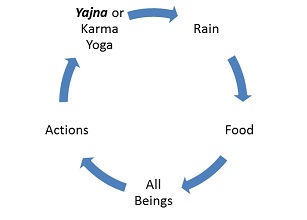Contribute
| Youth Conference 2012: Swami Vivekananda’s Message Of Sustainable Living |
Mona Khaitan
03/27/2012
From food, comes forth beings; from rain, food is produced; from yajna arises rain, and yajna is born of action. (B.G. 3:14) To participate in the Cultural program or for more information, please contact Jaya Asthana at jasthana@hotmail.com or 508-875-0432
Sustainable living in the West is understood as responsible living and decelerated use of natural resources to avoid depleting them further with its social, economic, and environmental impact in relation to food, shelter, and clothing. The Hindu tradition asks much more of man than a superficial change in lifestyle made by adopting recycling, organic farming, and lesser use of natural resources among others. In the Hindu tradition, there is a comprehensive view of sustainable living also known as dharmic living. It is a life that is full of yajna (renunciation and service) for the benefit of the Whole. Sri Krishna, in the Bhagavad Gita in the mantra 3:14, using great economy of words, explains the Universal Wheel of Action operating meticulously in the universe that governs all actions. The entire cosmic balance depends on this Wheel of Action. A wheel implies circularity and applies indiscriminately to all beings and non-beings existing in the
universe. 
Sustainable living is a life lived in accord with the Universal Wheel of Action so the balance in Nature remains undisturbed. Nature is both external and internal. When man changes his internal nature only then he can effect a change in his own behavior which translates into external actions. All actions are produced by thoughts. If the thoughts are polluted then the resulting actions would be similarly polluted. The ancient Rishis knowledgeable about this phenomena asked man to live by certain principles in life. Internal change in man is the chief prerequisite for sustainable living or dharmic living.
Sustainable Living, an ancient Hindu concept, requires man to live a life of yajna: renunciation and service. Over time, the language changes and man is unable to relate to the message of the Vedas, the Upanishads, the Ramayana, the Bhagavad Gita, the Bhagavatam, and other sacred literature too numerous to list. Divine incarnations appear from time to time to gently steer us in the right direction. The most recent divine incarnations of Sri Ramakrishna Paramhansa (1836-1886) and Sri Sarada Ma, the Holy Mother (1853-1920) came with their incomparable student Swami Vivekananda (1863-1902) for this purpose. Swamiji has lectured extensively around the globe and written volumes, amazingly in the English language, so all including people in the West could understand and benefit from his message without need for translation and the possibility of misinterpretation.
Swami Vivekananda provides fifteen laws of sustainable living for man to change his internal nature. When one tugs at a leaf the entire branch moves and comes forward. Similarly, when man follows one law whole-heartedly then the benefit of the other fourteen laws is experienced automatically.
Fifteen Laws of Life by Swami Vivekananda
1. Love Is The Law Of Life: All love is expansion, all selfishness is contraction. Love is therefore the only law of life. He who loves lives, he who is selfish is dying. Therefore, love for love's sake, because it is law of life, just as you breathe to live.
2. It is Your Outlook That Matters: It is our own mental attitude, which makes the world what it is for us. Our thoughts make things beautiful, our thoughts make things ugly. The whole world is in our own minds. Learn to see things in the proper light.
3. Life is Beautiful: First, believe in this world - that there is meaning behind everything. Everything in the world is good, is holy and beautiful. If you see something evil, think that you do not understand it in the right light. Throw the burden on yourself!
4. It's The Way You Feel: Feel like Christ and you will be a Christ; feel like Buddha and you will be a Buddha. It is feeling that is the life, the strength, the vitality, without which no amount of intellectual activity can reach God.
5. Set Yourself Free: The moment I have realized God sitting in the temple of every human body, the moment I stand in reverence before every human being and see God in him - that moment I am free from bondage, everything that binds vanishes, and I am free.
6. Don't Play the Blame Game: Condemn none: if you can stretch out a helping hand, do so. If you cannot, fold your hands, bless your brothers, and let them go their own way.
7. Help Others: If money helps a man to do good to others, it is of some value; but if not, it is simply a mass of evil, and the sooner it is got rid of, the better.
8. Uphold Your Ideals: Our duty is to encourage everyone in his struggle to live up to his own highest ideal, and strive at the same time to make the ideal as near as possible to the Truth.
9. Listen to Your Soul: You have to grow from the inside out. None can teach you, none can make you spiritual. There is no other teacher but your own soul.
10. Be Yourself: The greatest religion is to be true to your own nature. Have faith in yourselves!
11. Nothing Is Impossible: Never think there is anything impossible for the soul. It is the greatest heresy to think so. If there is sin, this is the only sin - to say that you are weak, or others are weak.
12. You Have the Power: All the powers in the universe are already ours. It is we who have put our hands before our eyes and cry that it is dark.
13. Learn Everyday: The goal of mankind is knowledge... now this knowledge is inherent in man. No knowledge comes from outside: it is all inside. What we say a man 'knows', should, in strict psychological language, be what he 'discovers' or 'unveils'; what man 'learns' is really what he discovers by taking the cover off his own soul, which is a mine of infinite knowledge.
14. Be Truthful: Everything can be sacrificed for truth, but truth cannot be sacrificed for anything.
15. Think Different: All differences in this world are of degree, and not of kind, because oneness is the secret of everything.
It is recommended that all participants register in advance by sending an email to yhpa.yconf@gmail.com.
For more information please visit <
You may also access this article through our web-site http://www.lokvani.com/

